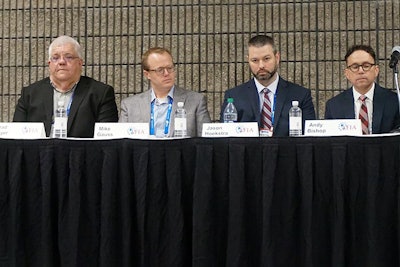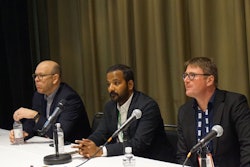
Transparency may be the most important factor in creating a successful employee atmosphere at the feed mill. The American Feed Industry Association (AFIA) hosted a panel discussing methods for a positive employee culture in a feed mill, Creating the Right Employee Culture in Your Plant, during their Feed Production Education Program on Wednesday, February 13, at the 2019 International Production & Processing Expo (IPPE). Held at the Georgia World Congress Center (GWCC) in Atlanta, Georgia, February 12-15, 2019, IPPE is the world's largest annual poultry, meat and feed industry event.
The panel consisted of Mike Gauss, president of Kent Nutrition Group; Jason Hoekstra, CEO of EPL Feed; Brad Guyer, product manager with United Animal Health/Prairie Systems; and Andy Bishop, vice president of operations with Kalmbach Feeds.

From left to right: Brad Guyer, product manager with United Animal Health/Prairie Systems; Mike Gauss, president of Kent Nutrition Group; Jason Hoekstra, CEO of EPL Feed; and Andy Bishop, vice president of operations with Kalmbach Feeds (Deven King)
While the four panelists offered their own interesting perspectives, they did have multiple commonalities in their suggestions for creating a successful employee environment. Those included:
- Transparency The panelists explained that keeping openness between supervisors and employees creates an environment where expectations are understood and everyone is held credible for their actions. Gauss said that humble leadership, treating others with respect, empowering people and admitting your own faults are all good ways to supervise.
- Technology Supervisors should understand that while employees may find technology helpful, they might also find that it makes day-to-day practices more challenging. If a company is going to utilize a new form of technology, they should make sure employees get proper training and understand the intent of the new technology. Bishop explained that a company shouldn’t buy a product just because a competitor has it, and that it is important to understand that new technology won’t always fix an issue. “It [technology] can be like putting a Band-Aid on something that need surgery,” he said.
- Financials Keeping employees in the know about the financial status of the company can give them a sense of ownership and allow them to identify with the firm’s success. Hoekstra explained that he feels more employee knowledge is better, as it gives workers the ability to see how every job impacts the bottom line. In order to maintain company confidentiality, it might be better to share this information at a company meeting rather through email or other printed documentation.
- Rewards Employees should be honored. Rewards may come in various forms, including but not limited to recognition in front of coworkers, a monetary reward or even physical gifts. If people are called in to help when they wouldn’t typically be working they should be recognized, whether that is a simple thank you or an additional amount of payment. The group explained that supervisors shouldn’t expect workers to do anything that they themselves wouldn’t be willing to do. Bishop explained that companies can’t afford to lose good employees, so show them you value their time. Guyer added that at the end of a big project is a good time to reward your staff.

















